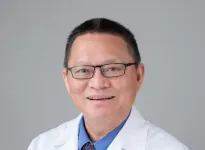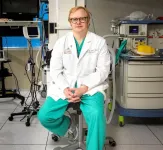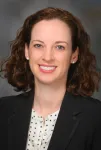(Press-News.org) LAWRENCE -- The COVID-19 pandemic has created new perils and challenges for people experiencing substance use disorders and addictive behaviors. Social distancing and isolation can trigger loneliness, anxiety and depression. These circumstances have put some "recreational users" at risk for developing addictions and caused some in recovery from addictions to relapse.
At the same time, the pandemic has made it nearly impossible for mutual-help (e.g., AA, NA) recovery groups to gather in person, forcing a scramble to provide remote support through platforms like Zoom.
Now, researchers at the Cofrin Logan Center for Addiction Research and Treatment at the University of Kansas Life Span Institute have published their experience making SMART Recovery groups available via computer and telephone to the community in Douglas County. Their paper appears this month in the peer-reviewed Journal of Substance Abuse Treatment.
According to lead author Dr. Bruce Liese, professor of family medicine and psychiatry at the University of Kansas Medical Center and clinical director at the Cofrin Logan Center, his team established seven weekly in-person SMART Recovery group meetings at various community institutions prior to the pandemic. These meetings took place at the Lawrence Public Library, KU, the Douglas County jail, Mirror Inc. and the Bert Nash Community Mental Health Center.
"It's a free mutual help group, somewhat like a 12-step program, where people support and help each other," Liese said. "The difference is that SMART Recovery is based on scientific principles and evidence - particularly evidence about addiction, treatment, what works and what doesn't work. It's based on Cognitive-Behavioral Therapy and readiness-to-change research. I believed SMART Recovery would be perfect because, coming out of the university, our program had to be based on scientific evidence."
Growth of the in-person meetings was slow at first, but soon KU researchers tallied 229 different participants who attended these groups for help with chemical and behavioral addictions ranging from addictions to alcohol, methamphetamine, cannabis, opioids, nicotine and gambling.
But that all changed once the pandemic took hold in March last year.
"They had to close the library and other facilities where we were meeting," Liese said. "Thanks to the SMART Recovery central office, we returned online with funding for Zoom meetings from their office. And at first, we went through the same thing -- meetings with just one person. But over the past months we've had upwards of 20 people in online meetings. So, it has grown again. SMART Recovery was very generous in providing us with a Zoom account. Once again, we can have as many meetings as the community needs. We have two active meetings in the community now: on Wednesdays and Fridays from 5 to 6:30 pm."
As with in-person SMART Recovery meetings, the virtual meetings are led by volunteer facilitators drawn from the community and university, who receive online and live (Zoom) training.
"The SMART Recovery central office offers a facilitator training program online for people who are interested in facilitating these groups," Liese said. "The online training involves at least 20 hours of watching videos, reading and taking exams ... so it's a pretty massive endeavor. I took the online training right away and found it interesting and stimulating. It focuses on what works, what doesn't work, while emphasizing the importance of interpersonal relationship skills. The training teaches active listening so people know you're hearing what they're saying. It made sense to do this kind of training in the community. SMART's excellent online training enabled us to quickly develop these free groups as a safety net for those who need one."
Soon after starting online meetings, Liese was determined to make meetings available to people who didn't have the high-speed internet access needed for the Zoom platform. So, he extended the remote SMART Recovery meetings to the telephone as well, a service called SMARTline.
"I see up to 30 patients a week on Zoom as a faculty member and clinician in the Family Medicine Clinic at KU Medical Center," he said. "But I have some patients who have no computers or no computer capabilities. I offer telephone visits to them. I thought we could do this for SMART Recovery. So, we came up with SMARTline: a service for anyone with a phone who is struggling with addiction. SMARTline, also based on SMART Recovery principles, is offered every single day of the week from 4 to 8 p.m. If you dial 785-550-0764 you will get to talk to a SMARTline volunteer."
Liese's co-author and collaborator in establishing SMART Recovery groups in Douglas County is project coordinator Corey Monley, at the Cofrin Logan Center for Addiction and Research Treatment.
"He is so vital to the process -- we've had so many logistical demands that could never have been met without his hard work," Liese said. "He's the project coordinator and a volunteer. He runs the group on Fridays. He is the brightest, hardest-working person I've ever had in a position like this. He graduated from KU a couple of years ago. He's applying to Ph.D. programs. This is his first publication, and his work in this area is very likely to be the foundation for the rest of his career."
Liese said he is grateful to the Douglas County Community Foundation and the Douglas County Commission, which provided funding for SMART Recovery facilitator training and supervision. He also appreciates Lawrence Public Library and describes it as "a wonderful community partner." The library has donated meeting space for training and group meetings and treated group participants as valued guests.
Liese said he's learned a lot from his experience running SMART Recovery groups during the pandemic. For example, he now fully understands that flexibility and ongoing communication with stakeholders, as well as people in recovery, are keys to sustaining a program during challenging times.
"We have learned that telehealth is effective for all kinds of psychological services," he said. "But we found it was difficult, with agencies closed, to let people know where to find us. Back when somebody could pick up an information card at the library and slip it into their pocket, it made it a lot easier. We've also learned the importance of establishing advanced plans, and being light on your feet, ready for what's needed instead of remaining stuck in what you're used to doing. Getting everyone involved -- stakeholders and the public -- is gigantic. And continuing to recruit volunteers has been especially important during COVID."
People seeking help with substance use disorders and other behaviors can contact SMART Recovery in Douglas county by dialing 785-550-0764. They can also reach out to Liese via email. A list of Zoom meetings can be found here.
INFORMATION:
The colons of African-Americans and people of European descent age differently, new research reveals, helping explain racial disparities in colorectal cancer - the cancer that killed beloved "Black Panther" star Chadwick Boseman at only 43.
Scientists led by UVA Health's Li Li, MD, PhD; Graham Casey, PhD; and Matt Devall, PhD, of the Center for Public Health Genomics, found that one side of the colon ages biologically faster than the other in both African-Americans and people of European descent. In African-Americans, however, the right side ages significantly faster, explaining why African-Americans are more likely to develop cancerous lesions on the right side and why they are more likely to suffer colorectal cancer at a younger age, ...
The study concludes that vegan diet has a broad effect on children's metabolism. Serum biomarker levels for vitamins A and D, cholesterol forms and essential amino acids were significantly lower in children on vegan diet compared to age-adjusted omnivores. In addition, docosahexaenoic acid is absent from vegan diet. The results were recently published in a high-profile international scientific journal EMBO Molecular Medicine.
Vegan diets gain popularity especially among young adults, and through choices of the families vegan diet is becoming more common in young children, too. The motives behind choosing a vegan lifestyle are ecological, ethical and health-related: vegan ...
ARLINGTON, Va. (Jan. 21, 2021) -- A new research agenda developed by 40 leading experts in healthcare epidemiology and infectious diseases defines the critical areas of study to inform clinical practice, policy, and prevention strategies for COVID-19 and future pandemics. "COVID-19 Research Agenda for Healthcare Epidemiology," published today in Infection Control & Hospital Epidemiology, the journal of the Society for Healthcare Epidemiology of America, identifies the gaps in the understanding of the epidemiology, transmission, and individual as well as public health consequences of viral diseases that were revealed through some of the worst phases of the ...
Philadelphia, January 21, 2021 - Researchers have developed a new integrated genetic/epigenetic DNA-sequencing protocol known as MultiMMR that can identify the presence and cause of mismatch repair (MMR) deficiency in a single test from a small sample of DNA in colon, endometrial, and other cancers. This alternative to complex, multi-step testing workflows can also determine causes of MMR deficiency often missed by current clinical tests. Their results are presented in the Journal of Molecular Diagnostics, published by Elsevier.
MMR genes monitor and repair errors that can occur in normal cell replication and recombination. In some inherited and acquired cancers, one or more of the MMR genes are deactivated. "The impact of ...
COLUMBIA, Mo. - Kerry Karaffa is the first MU Counseling Center psychologist to be embedded specifically within the University of Missouri College of Veterinary Medicine, where he provides tailored counseling services for professional students training to become veterinarians. He is also aware that veterinarians are at increased risk for mental health concerns and suicidality compared to the general public due to the stressful demands of the job.
To help universities better serve students dealing with high levels of stress and anxiety, Karaffa conducted a research study in which he developed and distributed a survey to other counselors specifically embedded in veterinary ...
A pain management regimen comprised mostly of over-the-counter medication reduced opioid exposure in trauma patients while achieving equal levels of pain control, according to a new study by physician-researchers at The University of Texas Health Science Center at Houston (UTHealth.)
Results of the study, which was conducted at the Red Duke Trauma Institute at Memorial Hermann-Texas Medical Center, were published today in the Journal of American College of Surgeons.
"The research shows us that seriously injured people with acute pain can effectively be treated with an opioid-minimizing strategy," ...
A phase 2 clinical trial providing personalized treatments based on the genetic profile of metastatic tumors in gastroesophageal cancers has found that using customized treatment approaches, and adapting them over time as tumors become resistant, led to higher rates of survival compared to historical controls. The final results were published online on Jan. 21 in Cancer Discovery, a journal of the American Association for Cancer Research.
Advances in technology have made it possible for scientists and physicians to use information about the genetic makeup of a cancerous tumor to inform cancer treatment, but genetic heterogeneity ...
ROCHESTER, Minnesota -- A new multi-institution study led by Fergus Couch, Ph.D., a Mayo Clinic pathologist, provides more accurate estimates of breast cancer risk for U.S. women who harbor inherited mutations in breast cancer predisposition genes. The findings of the CARRIERS Consortium study, which were published Wednesday, Jan. 20 in the New England Journal of Medicine, may allow health care providers to better assess the risk of breast cancer in women ? many of whom have no family history of breast cancer ? and provide more appropriate risk management strategies.
"Traditionally, genetic testing of inherited breast cancer genes has focused on women at high risk who have a strong family history of breast cancer or those who were diagnosed at an early ...
HOUSTON -- Researchers from The University of Texas MD Anderson Cancer Center have developed the first comprehensive framework to classify small-cell lung cancer (SCLC) into four unique subtypes, based on gene expression, and have identified potential therapeutic targets for each type in a study published today in Cancer Cell.
SCLC is known for rapid, aggressive growth and resistance to treatment, which leads to poor outcomes. While recent advances in immunotherapy and targeted therapy have improved survival for non-small cell lung cancer (NSCLC), progress for SCLC has been limited.
"For decades, small-cell lung cancer has been treated as a single disease because the tumors all ...
Older people in Japan have an "attitude of gratitude" which keeps them feeling hopeful despite the challenges of aging, a new study says.
Feeling thankful and grateful for the care and support they have had during their life helps pensioners in the country to be more optimistic, even when they experienced difficulties and were anxious about getting older, an expert found.
Dr Iza Kavedžija, from the University of Exeter, observed people in their 80s and 90s in the course of long-term ethnographic fieldwork in a merchant neighbourhood in the city of Osaka. Her research is published in the journal Anthropology and Aging.
Dr Kavedžija found many members of ...




